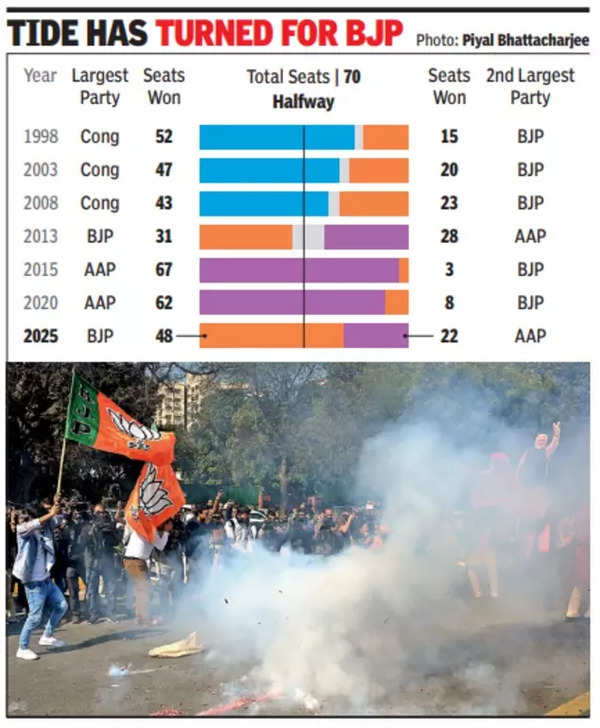The Delhi election results, which have brought BJP back to government after 27 years, can be summed up in one line: the aam aadmi voted against the leadership of Aam Aadmi Party, but not necessarily against the idea of AAP. There can be no other explanation when many top leaders, including Arvind Kejriwal, who made this election a referendum on himself, lost their seats – but the drop in AAP’s seat count was not mirrored in a commensurate drop in vote share, which came within a stone’s throw of BJP’s.
BJP proved that an elephant can dance.
Delhi Election Results 2025
It was nimble enough to finetune strategy to make the Delhi election both local and national. Congress, in order to keep its own political future safe from intruders, marginally helped by making the defeat of Kejriwal a higher priority than defeating BJP.
If there is one thing politicians can learn from the AAP debacle, it is to eschew hubris and over-ambition. BJP got a taste of the blowback from cockiness in Lok Sabha elections, but it wasn’t a crippling blow. Now Kejriwal has faced a full electoral backlash and is out of government in Delhi, his launchpad to national fame.
Kejriwal lost for two major reasons apart from hubris. One, thanks to the liquor scandal and the spending of large sums on his official residence, the electorate saw that the man they voted for (a pro-poor, anti-corruption crusader) may not be who he claimed to be. It’s no crime for a CM to have a reasonably well-equipped residence, but it went against Kejriwal’s well-cultivated image of living the life of aam aadmi. He made things worse for himself by, among other things, making wild allegations about Haryana trying to poison Delhi’s waters. No voter likes to see his future CM sounding a bit unhinged.
BJP, for its part, sought to consolidate the middle-class vote – Delhi is India’s predominant middle-class city – without losing other segments. The budget’s tax sops helped.

Delhi has two attributes that contribute to political hubris. As the national capital, anyone who runs it gets national attention. Secondly, as a city-state with high revenues but only some of the costs of running a state, it gives you the freedom to use these resources to offer endless freebies to get yourself elected. Unlike regular states, Delhi doesn’t have to pay for policing and pensions, two very big expenditure areas for most states.
Kejriwal misused these advantages. He used the revenue surpluses (now largely gone) for freebies and self-promotion, spending hundreds of crores to build his image in other states, by issuing front-page print and primetime television ads. Why does a man running a prosperous city-state need to spend its taxpayers’ money elsewhere?
Hubris began immediately after the thumping 2015 assembly victory, where his party won 67 of Delhi’s 70 seats. Kejriwal began to see himself as a potential PM and used Delhi’s resources to project himself in that light. In Delhi, he held no portfolios, leaving the actual job of running his administration to Manish Sisodia and other ministerial colleagues. Clearly, his focus was less on doing a mayoral job in Delhi, and more on his next move up the national political ladder.
For someone without Kejriwal’s over-ambition, Delhi’s high revenues could have been used for really improving the state of primary and secondary education and basic healthcare. And, initially, this was indeed his party’s focus and some real change appears to have begun in these areas. But it wasn’t carried through to becoming a viable model fit for replication elsewhere. The Kejriwal model didn’t prove useful to anyone, except to make free power and water the basic poll prepayment required for any party to win an election. These questionable ideas were used to win the Punjab assembly election, but that state does not have the resources to sustain such freebies endlessly and is now deep in debt.
Kejriwal also played his politics poorly, losing allies along the way. He saw himself as the national alternative to BJP and Modi, when this could have been possible only at the expense of Congress, which governs much larger states than Delhi. This contributed to his election loss, as Congress realised that AAP was a threat to its national stature and sought to undercut it.
The Delhi defeat should bring Kejriwal down to earth. If he really introspects, he will emerge a much better politician. He should first do the hard job of making his policies and potential known beyond Delhi without using freebies as his only calling card. He has the political savvy to bounce back but only if he abandons hubris. Contrary to his own assumptions, he is not – yet – God’s gift to India. AAP still has brand salience but he squandered it this time.
For BJP, the test of good governance begins now. If any state could do with a double-engine sarkar, it’s the half-state of Delhi.
